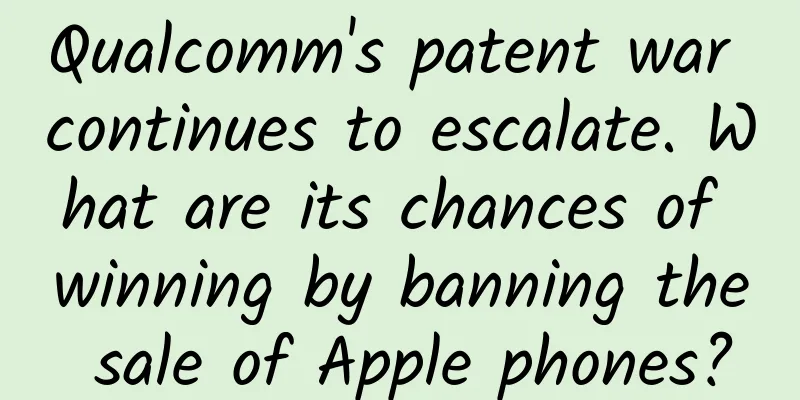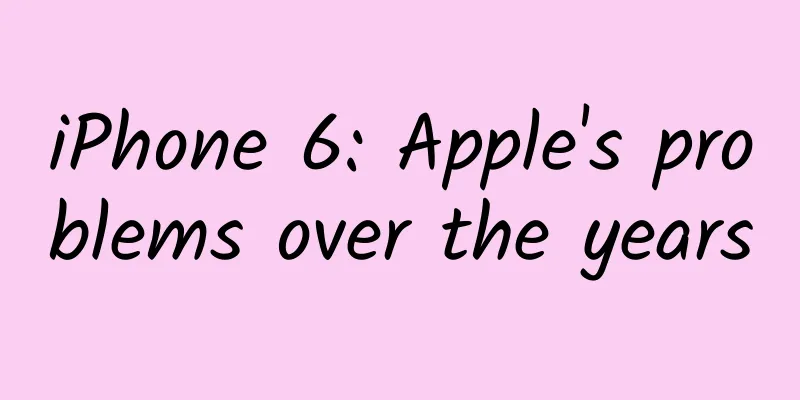Qualcomm's patent war continues to escalate. What are its chances of winning by banning the sale of Apple phones?

|
In the cold winter of 2018, the patent war between Qualcomm and Apple continued to heat up. The patent lawsuit, which lasted for more than a year, has reached the threshold of bargaining. On December 20, Qualcomm won the patent infringement case against Apple in Munich, Germany, and Apple phones were also banned from sale by German regulators. Before the ban on iPhone sales in Germany, Qualcomm and Apple's patent lawsuit in China also came to an end. Qualcomm won the case and applied to the Fuzhou Intermediate People's Court for an iPhone sales ban. Qualcomm released a statement saying that the court had approved Qualcomm's iPhone sales ban, requiring Apple to stop importing and selling iPhone products in China. The models affected by the ban include iPhone 6S, iPhone 6S Plus, iPhone 7, iPhone 7 Plus, iPhone 8, iPhone 8 Plus and iPhone X, and the ban is effective nationwide. Half a month has passed, and Apple phones have not been banned from sale in China. Apple requested a review of the court's ban and refused to enforce it. In other words, although Qualcomm won the patent lawsuit in China, it did not hurt Apple's interests. As we all know, Apple's mobile phone sales in China are very large, and it is the market with the fastest profit growth for Apple. According to data released by Canalys, in November this year, Apple's mobile phone sales were 4.83 million units, with a market share of 13.3%, ranking fifth. Obviously, once Apple phones are banned from sale, Apple's performance will be seriously affected. After Apple refused to implement the sales ban in China, Qualcomm once again stepped up its patent war and applied to the court for compulsory execution. Qualcomm's attorney said that it had applied to the court for compulsory execution. If Apple still refuses to implement the ban, according to relevant laws, Qualcomm has the right to apply for fines, detention, exit restrictions and credit system records against the legal representatives of the four Apple companies in China who refuse to implement the court ban.
From a legal perspective, the enforcement application submitted by Qualcomm is very lethal. In addition, Qualcomm's representative lawyer also revealed that Qualcomm has added new models such as iPhone XR/XS/XS Max to the 24 patent infringement lawsuits it has filed against Apple in China. If the court rules that Qualcomm's application is valid, all Apple phones will be offline in China. By then, Apple will have no phones to sell in China. It has to be said that Apple's move is a bit cruel and is intended to kill Apple. Since Qualcomm has filed patent lawsuits against Apple in many countries and regions around the world, only a few cases have been completed. As far as the current situation is concerned, Qualcomm has the upper hand in this round of patent lawsuits. The ban on the sale of Apple mobile phones in Germany and China has dealt a heavy blow to Apple. Although Apple has refused to implement the ban in China, under the pressure of Qualcomm, it is likely that Apple mobile phones will be banned from sale. It is not difficult to predict that once Apple phones are banned from sale, Qualcomm will have more say in this patent lawsuit. At that time, Apple will have no choice but to settle with Qualcomm under pressure, which is also the real purpose of Qualcomm's lawsuit against Apple. To put it bluntly, Qualcomm filed patent lawsuits against Apple in many countries around the world in order to force Apple to use Qualcomm's baseband again. Previously, Apple gave up cooperation with Qualcomm because Qualcomm's patent licensing fees were too high and introduced Intel as a partner. In fact, Apple's abandonment of Qualcomm and its embrace of Intel is still a struggle for interests. In recent years, the sales of Apple phones have continued to decline. In order to increase profits, Apple began to lower the cost of the supply chain, including Qualcomm. Among multiple suppliers, Apple has to pay nearly 10 billion in patent licensing fees to Qualcomm every year. To this end, Apple introduced the lower-cost Intel baseband and tried to force Qualcomm to reduce patent licensing fees. Now it seems that Apple's wishful thinking may fail. What is certain is that after Qualcomm applied to the court for an enforcement order, the probability of Apple's mobile phones being banned from sale in China is very high. In the first round of the Apple-Qualcomm patent lawsuit, Qualcomm had the upper hand, and the domineering Apple had no choice but to compromise. The two companies will soon enter into settlement negotiations for the patent lawsuit. |
<<: iOS 12.1.2 shows 4G but can't connect to the Internet? Here is a temporary solution
>>: WeChat Mini Program Assistant released: a must-have for developers
Recommend
Is it feasible to actively "vaccinate" by picking a good strain? Why do some people have mild symptoms while others have severe ones?
Recently, as the number of COVID-19 infections ha...
The Force Blog: Passive Explosion of Followers on Public Accounts
Resource introduction of "Passive Explosion o...
Tik Tok account blocked? Guide to unblocking TikTok account!
If your Douyin account is banned, how should you ...
Why do people laugh so hard that they can't close their mouths? The secret that makes people drop their jaws...
"Hahaha, I can't stop, I can't stop ...
National Hypertension Day丨How can I determine whether my blood pressure is normal or not?
In daily life, many people are diagnosed with hig...
High-level growth: building and applying 3 growth models
Building a growth model is in the lower half of f...
Refined delivery operation of huge amount of Qianchuan delivery
Today, let’s talk about the refined delivery of J...
Sleeping all day long, who is the "king of sleep" in the animal kingdom?
Produced by: Science Popularization China Author:...
Risk warnings could not stop Zotye from hitting the daily limit 70 times, but it still failed to find a buyer.
Zotye, the "Porsche" that once relied o...
How to make your landing page more effective?
A landing page is also called a landing page. It ...
How to increase sales of e-commerce websites?
If someone asked you how to increase sales of an ...
CIC China Insights Consulting: 2017 China Culture and Entertainment Industry Blue Book
The latest blue book from CIC China Insights Cons...
China Association of Automobile Manufacturers: A brief analysis of the sales of the top ten SUV manufacturers from January to March 2023
According to statistics and analysis by the China...
They have no money and no resources, and they are also chasing hot topics, so why can they create 100,000+?
This is an era of chasing hot spots, and everyone...









